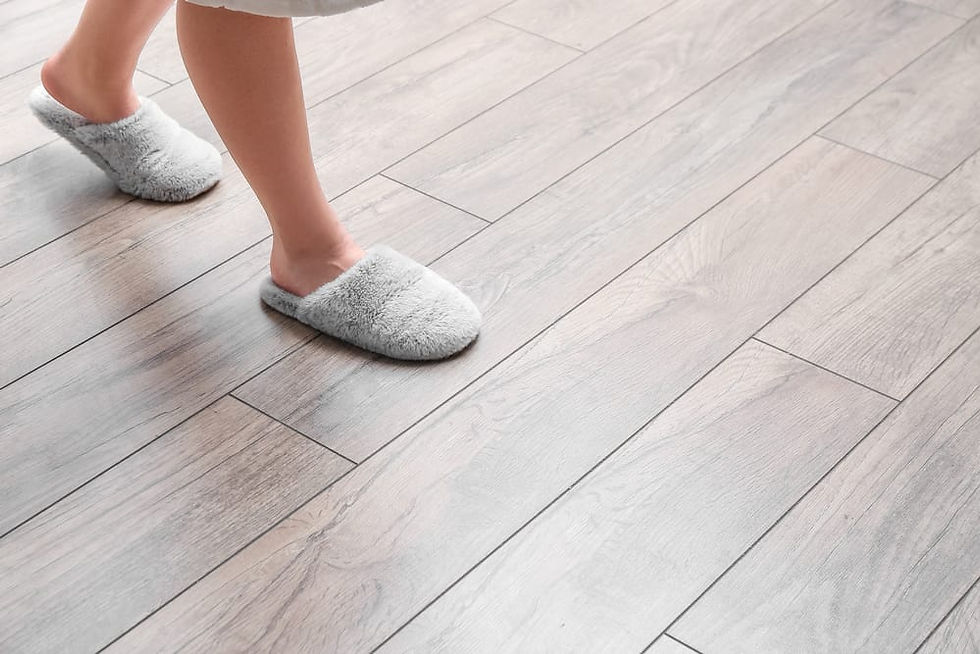Why Your LVT Floor Sounds Noisy—and How to Fix It Like a Flooring Pro
- Charlie Mac

- Jul 17, 2025
- 4 min read

“Ever wondered why your LVT floor conducts a drum solo underfoot, while your neighbour’s remains silently sleek? That click‑clack isn’t just annoying—it’s a clue to a fixable design or installation flaw.”
Introduction
Luxury Vinyl Tile (LVT) delivers style, comfort, and low maintenance, but can also betray you with loud clicks or squeaks. If you're someone who loves understanding how things work, and want to silence that noise efficiently, this guide is built for you. You'll learn exactly what's behind the sound and how to eliminate it with engineering-level precision.
Why LVT Floors Make Noise
Micro‑vibrations on a Bouncy Subfloor
When the subfloor flexes under pressure—due to wide joist spacing, weakened plywood, or moisture—it transmits micro-vibrations. These movements cause friction between LVT planks, which amplify into audible clicks. Standard joist spacing may not be adequate for all subfloor materials, and moisture can further weaken plywood integrity. Pro tip: Use a long straightedge to uncover uneven spots—and a moisture meter to detect hidden moisture issues.
Compressibility in the Underlay
Floating LVT depends on padded underlay (foam, cork, rubber) for comfort—but that cushioning also permits plank movement. Step compression causes edges to rub and squeak.
Pro tip: Cork underlay offers better acoustic control (higher dB reduction) than basic foam—making it the professional choice.(See underlay differences in Quick‑Step specs.)
Install Errors = Sound Sources
Missing expansion gaps allow thermal expansion to buckle or cup flooring
Uneven subfloors impose uneven stress on planks
Substandard LVT (SPC/WPC cores) with poor tolerances misalign click-lock edges Reference guide: Karndean Designflooring’s installation specs clarify these key steps.
Pro-Level Solutions for Silent Floors
1. Let It Acclimate (and Settle)
Allow 6–12 months for your LVT to adjust to room conditions. As it settles, joints tighten, and noise typically subsides within weeks.(DIY review: search “LVT acclimation time Reddit” to read firsthand stories.)
2. Remove Underlay (Precision Method)
If underlay drives noise, this fix is fast and effective:
Use a suction cup or pry bar to lift planks at a corner
Remove or swap the pad for a thin cork layer
Ensure the subfloor is flat and clean to reduce visible imperfections
Relock planks carefully
Pro tip: Check warranty terms—underlay changes may affect coverage.
3. Level & Fill Subfloor Voids
For persistent squeaks:
Mark noisy areas with tape
Lift specific boards
Apply self-levelling compound (Ardex, Mapei) or plywood shims
Allow 24–48 hours drying before reinstallation
Verify levelness with a straightedge
4. Opt for Glue‑Down or Loose‑Lay Installation
Achieve silence by limiting plank movement:
Glue‑down LVT bonds the floor directly to subfloor—no float
Loose‑lay uses heavy planks and anti-slip backing for stabilityExplore adhesives: Pressure-sensitive, hard-set, and moisture-cured options. Note: glue-down makes future removal more complex.
5. Reinforce from Below (Shim + Screw)
Ideal for crawlspaces/basements:
Walk floor and locate squeaks
Insert shims or use counter-snap screws into joists
Screw heads snap flush for a seamless subfloor
Safety first: Wear eye protection and check for hidden wires or pipes before drilling.
Tools of the Trade
Essential for any enthusiast approaching this like a flooring engineer:
Long straightedge
Moisture meter & Stud detector (subfloor and joist testing)
Suction cup or pry bar
Self-levelling compound and trowel
Knee pads and eye protection
Counter‑snap screws and drill
Adhesive
DIY or Call a Pro?
✅ DIY-Friendly: letting it settle, underlay removal, localised leveling
🔧 Professional Help: structural issues require a structural engineer; large glue-down jobs call for a licensed flooring contractor such as London Flooring Fitters (based in London - covering : Greater London, Essex, Kent, Surrey)
Quick Comparison of Fix Options
Fix Method | Noise Reduction | DIY Skill | Longevity | Cost |
Let it Settle | Medium | Easy | Low | £ |
Remove/Replace Underlay | High | Medium | Medium | ££ |
Level Subfloor Voids | Very High | Medium‑Hard | High | ££-£££ |
Glue‑Down / Loose‑Lay LVT | Very High | Hard | Very High | £££ |
Shim + Screw from Below | Very High | Hard | Very High | ££-£££ |
FAQ
Q1: Why is LVT noisy months later? Because micro-movement continues as environmental conditions change and floating floors stabilize over time.
Q2: Can underlay be the culprit? Yes—especially soft or thick pads. Cork or thin pads, or no underlay at all, typically resolve the issue.
Q3: Is glue-down always quieter? It’s extremely stable, but future repairs require job-site cutting and replacement—less flexible than floating systems.
Q4: Can squeaks be fixed without lifting planks? Some use squeak-repair kits, but lifting and correcting the underfloor structure is the most reliable fix for LVT.
Q5: How much should I budget? Waiting and underlay fixes are budget-friendly. Glue-down and structural fixes involve higher costs, depending on scope and labor.
Further Reading & Resources
BuildDirect – Squeaky Floor Solutions: Top-down joist repair methods
NWFA : National Wood Flooring Association
Karndean Installation Guides: Authoritative LVT instruction manuals
“Shim & Screw Squeaky Floor Fix” Video: In-depth technical DIY walkthrough
Conclusion
A noisy LVT floor isn’t a design failure—it’s a mechanical signal. Armed with insight, the right tools, and this guide, you can diagnose and silence the issue like a true flooring engineer. Silent sophistication is within reach—let’s fine-tune that floor.







Comments